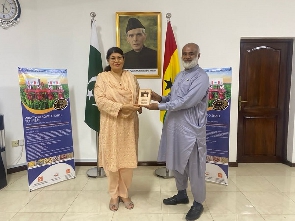 Pakistan High Commissioner to Ghana, Farhat Ayesha (left)
Pakistan High Commissioner to Ghana, Farhat Ayesha (left)
The government has been urged to intensify and diversify productivity through its flagship agricultural policies by taking advantage of modern mechanization opportunities.
Coupled with the availability of arable land, the government was bound to reap higher dividends if agricultural mechanization became the government's top priority.
This came to light when a four-member business delegation called on the Pakistan High Commissioner to Ghana, Farhat Ayesha to welcome her and to formally apprise her of the setting up of KNZ Enterprise Ghana Limited, a company setting its sight on the competitive sale of modern agricultural machinery, premium quality bedsheets among others.
The delegation, who are shareholders of the company included Zafar Yab Anjum, Director of sales, and Marketing, Muhammad Yasir, Director, Rehmatullah Kashif, Director and Mr. Ali Nuhu Abeka, Chief Executive Officer and the only Ghanaian member of the Pakistan delegation.
Explaining further in his opening remarks, Mr. Anjum encouraged government and Ghanaian business entities to tap into economic opportunities in Pakistan to promote cooperation in trade and business.
He said Pakistan is also an agrarian country where agricultural universities are creating advanced knowledge and human resources necessary for the progress of the agricultural sector in this technological age.
He said by prioritizing farm mechanization, Ghana could unlock its agricultural potential and pave the way for sustainable development in the years to come.
According to him, Pakistan has made significant advancements in the field of agriculture technology, especially in areas like irrigation, mechanization, and crop management and Ghana could benefit from adopting these technologies to improve the fortunes of agriculture by partnering with Pakistan.
He said sharing knowledge, expertise, and best practices between the two countries could lead to improved agricultural techniques, crop varieties, and pest management strategies.
Collaborative research projects, he said, between the two countries could lead to the development of crop varieties better adapted to local conditions in both countries.
He appealed to the government to reduce taxes on agricultural machinery to boost their purchases and thereby increase productivity.
Mr. Anjum further emphasized the importance of processing agricultural products to add more value to the products than exporting them in their raw state.
On her part, Ambassador Ayesha said the business relationship between Pakistan and Ghana remains a topmost priority.
She said there was a lot of potential for the future of both countries as far as trade in light machinery, surgical instruments, sports goods, and textiles was concerned adding that the textile industry remains a backbone of Pakistan's economy.
According to her, the presence of a Pakistan High Commission in Ghana was ample evidence of the warm relationship between the two countries.
Diplomatic relations between the two countries, she said, date back to 1958 adding that the embassy has been in Ghana since 1964.
"We want to promote and take this relationship to another level in all spheres of cooperation", she said.
She expressed her delight with the advent and operation of KNZ enterprises in Ghana which would add value to Ghana's economy in the area of food security.
She said the High Commission has rolled out scholarship programs for Ghanaian students offering Mechanical and Electrical Engineering particularly students at the Kwame Nkrumah University of Science and Technology.
She indicated that the scheme would be announced every year, therefore students within the domain should avail the opportunity.
In a remark, Mr. Abeka, who had a lengthy period of his education in Pakistan, described the country as hospitable with warm people and full of economic opportunities unknown at face value to most people.
He said Pakistan has some of the best agricultural universities in addition to organizing professional training in engineering and medicine, adding Ghana could benefit from their expertise.
According to her, manual farming was a predominant feature of farming in Ghana, which, however, retards productivity, and taking advantage of these modern machinery would change the narrative to a large extent.
He said agricultural institutions could leverage this opportunity and deploy mechanization to boost their intended objective with proper coordination.
Ghana, he said, was a peaceful country and it hoped the Pakistan partners would enjoy the business climate towards a fruitful partnership in the foreseeable and distant future.